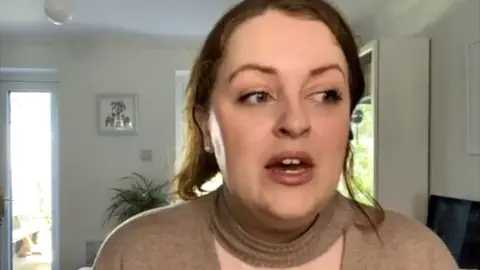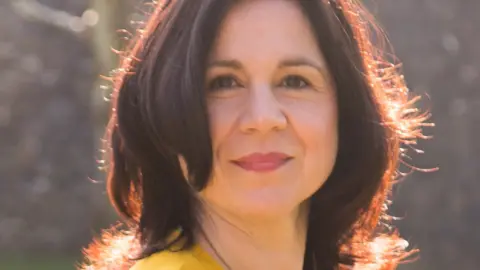BBC's Naga Munchetty reveals womb condition adenomyosis
The BBC's Naga Munchetty has revealed she has a debilitating womb condition.
Naga lives with a constant pain that can become so acute that she has to scream. A flare-up at the weekend was so bad her husband called an ambulance.
The presenter told her BBC Radio 5 Live listeners: "The pain was so terrible I couldn't move, turn over, sit up. I screamed non-stop for 45 minutes."
One in 10 women is thought to have adenomyosis, yet it can often go undiagnosed for years.
Naga has been sharing with her listeners her agonising wait for answers and a treatment.
She said: "Right now as I sit here talking to you: I am in pain. Constant, nagging pain.
"In my uterus. Around my pelvis. Sometimes it runs down my thighs.
"And I'll have some level of pain for the entire show and for the rest of the day until I go to sleep."
Other women have been in touch sharing their experiences.
What is adenomyosis?
- It is a condition where the womb lining (the endometrium) grows within the muscular wall of the womb too
- Although not life-threatening, it can cause severe symptoms
- These include extremely heavy and painful periods, a bloated tummy and pain during sex or when going to the toilet to poo
- Contraceptives can be tried to see if they lessen the symptoms, but for some women, surgery to remove the womb, a hysterectomy, is the only solution
Naga, 48, says she is resisting the hysterectomy route at the moment.
 BBC News
BBC NewsJen Moore, 34 and from Cambridge, had a hysterectomy very recently to treat hers.
Naga recorded an interview with her in the days leading up to the surgery.
Jen said: "I know it's the right decision for me and my body. But it's a massive decision at any age."
Jen does not have children but says she always thought she would have the option or chance. "So there is a little bit of emotional rollercoaster going on."
She says the pain of adenomyosis "feels like I have a bowling ball sat inside my pelvis pushing out on the bones from the inside out trying to break them. It's excruciating... It's relentless."
Like Naga, Jen's symptoms began as a teenager when she started her periods.
"I vividly remember being 11 and on my parents' bedroom floor unable to stand up straight, passing out every month from pain and blood loss."
When the family sought medical help, Jen was put on the contraceptive pill to "regulate" her hormones and sent home with no other investigations or a diagnosis.
Jen remained on it until she turned 30, still experiencing monthly bleeds that were "crazy heavy" and "like a horror scene".
"Whenever I would go to the doctor to explain it's happening, again, I was just told 'it's normal'. At one point I was told to 'stop making a fuss'.
"So eventually you just start questioning yourself, don't you? Almost gaslighting yourself."
Jen persevered with seeking help though and was recently referred to a specialist doctor who diagnosed her condition - adenomyosis, plus another problem called endometriosis.
Jen says: "I'm angry, I'm infuriated, I am devastated. I'm all of these things."
She got tired of people saying "but you don't look sick" and turned to her make-up artist friend, Kate, to help show what the condition feels like, by painting bruises and cuts on her abdomen and thighs. She has posted photos on Instagram to raise awareness.
GP Nighat Arif, who specialises in women's health and has written a book about menstruation and menopause, says awareness about the condition among healthcare professionals is improving.
But she says it can be difficult to "join the dots" and make a speedy diagnosis because the symptoms can be mistaken for other things and can vary between women.
"Even on an ultrasound scan the diagnosis of adenomyosis can be missed or not seen. Many younger women also can get placed on hormonal contraceptive treatments to manage heavy periods and therefore 'mask' the diagnosis," she says.
Consultant gynaecologist Liza Ball advised: "Period issues often get 'normalised', which is frustrating. Ask to see a GP with gynaecology training to discuss treatment options that suit you.
"Don't suffer in silence and seek help if you think you have adenomyosis."
The Department of Health and Social Care says it is committed to improving the health of women - it recently launched a 10-year Women's Health Strategy for England - and will be updating health information provided on the NHS website to provide more detail on conditions such as adenomyosis.
'It crushed me'
 Julia Allen
Julia AllenJulia Allen from Cardiff was eventually diagnosed with adenomyosis and endometriosis in her mid-forties after decades of suffering.
She says she was "back and forth to the doctor" from the age of 14 due to very heavy and painful periods.
"I would have to take spare clothes to school and eventually work due to the flooding I experienced. This was mortifying, especially in a time when people didn't talk about these kinds of things," she says.
"Over the years I was told it was irritable bowel syndrome or constipation. I eventually had a scan, where speckling in my uterus showed up. The GP turned to me and said 'I don't know how to treat you' and that was that."
Julia says she was never able to conceive, despite repeated rounds of IVF treatment, which she believes may have made her adenomyosis worse.
"When I eventually had my hysterectomy my consultant came to my room and said 'if I had seen you 20 years earlier, you could've had a baby'. It crushed me. My organs and insides have been ravaged."
Have you been affected by the issues raised in this story? Help and support is available via BBC Action Line.

Have you been affected by the issues in this story? Email your experiences [email protected].
Please include a contact number if you are willing to speak to a BBC journalist. You can also get in touch in the following ways:
- WhatsApp: +44 7756 165803
- Tweet: @BBC_HaveYourSay
- Upload pictures or video
- Please read our terms & conditions and privacy policy
If you are reading this page and can't see the form you will need to visit the mobile version of the BBC website to submit your question or comment or you can email us at [email protected]. Please include your name, age and location with any submission.

